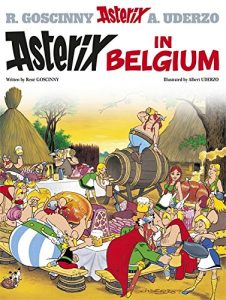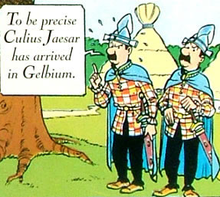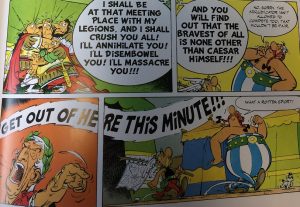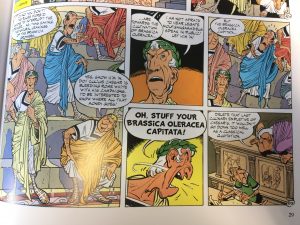Hail Caesar? Asterix and dictatorship
Note: For the module ‘Classics in Popular Culture’ (CLC315), students were asked to write blog posts on Classical Reception in the TV series Plebs or Once Upon a Time, and on the comics Asterix or George O’Connor’s Olympians. Some of the best blogs are featured on our departmental blog site.
Asterix in Belgium is a French comic book released in 1979 by Uderzo and Goscinny as an instalment of the Asterix comic series. This comic centres around a clever, pint-sized Gaul named Asterix living in an unconquered village of Gaul in 50BC, who goes on an adventure to Belgium, and has super strength when downing the potion created by Getafix for a limited time (kind of like the Hulk in Marvel just less green). Along for the ride is Asterix’s best friend Obelix, a dim-witted warrior with immense strength and an appetite for both boar and fighting (the brawn to Asterix’s brain). Their other companion is the loyal Dogmatix, who is coincidently also a dog. This story revolves around Asterix’s village attempting to re-establish who the bravest of the Gauls are, a reference to Caesar’s claim that the Belgians were “the bravest of the Gauls” in De Bello Gallico).[1]
The series’ humour revolves around stereotyping of ancient cultures and includes various references to both modern and historical pieces of literature and art to enhance the comedy of the series.
However, comics, especially ones that have a political undertone, must be looked at carefully: how representative is the comic of antiquity or is there an underlying criticism on the way society is run? Asterix being set in this time and the decision to take the point of view from the outside is to showcase the idea of resistance against domination.[2] Here the Gauls are resisting Caesar and the Roman rule. One way the comic achieves this is through the way Caesar is portrayed. Whilst not many people seem to hate him, his portrayal is that of every authoritative, narcissistic leader out there. These can be seen through his treatment of the senate (and his own people), his treatment of the Gauls (barbarians) and the way in which others view him. Is Caesar a representation of political leaders in the modern era?
Hail Caesar?
The way in which Caesar treats his senate can be seen through his disregard of the other magistrates and the senate rules as he allows the interruption of the meeting (not that the interruption of the cabbage talk was unwelcome, though it was a great use of a Belgian stereotype) but the way in which he goes about it shows the amount of importance he places on himself (or just his desperation for a subject change). Did Caesar himself go against the rules in antiquity also? As Gardner tells us, he has done so with intimidation tactics against opposition and carrying through legislation in defiance of fellow colleagues.[3] The importance of portraying this here, whilst it may have been an accurate depiction, is to question the ways in which political leaders may also use these tactics: the dictator is still seen in modern society; hence this serves as a criticism of how society is run. Caesar’s exaggerated body language shows he is bored with matters of everyday life: he is a man of action and a military leader. This presupposes his reaction to the Gauls’ quarrel (i.e. not peacefully.). His body language (the hand gestures) may also indicate a hidden violence if he is denied: they are unpredictable much like the man himself which makes him more of a dangerous figure.
The hand gesture could come from iconography however. In some statues Caesar (Augustus) is depicted as hands outstretched, which may represent his stance as a dictator and leader of armies, perhaps to indicate movement in giving a powerful speech. In Asterix, Caesar also partakes in a lot of shouting when denied, shown with bold lettering and the dialogue bubble extending over the border to show just how irate Caesar is: the panel cannot contain this anger. His words are generally accepted: his megalomania is never questioned.[4] This characterization goes against Caesar’s self-portrayal in his own writings. Caesar’s character here is to give us the view of a dictator: he is to be obeyed and his will is to be carried out. If not, he will turn his anger inwards towards his allies.[5] However the way this is drawn is to add a humorous turn whilst dealing with the uncomfortable issue of having an influential time bomb in charge of the country. (To modern audiences now, the likeness of Caesar and his behaviour can be likened to that of the president of the US, who also tends to shout and interrupt others, looks orange, and believes himself to be of a higher standing.)
Brave Caesar?
In Asterix in Belgium, instead of creating peace between the two Gallic factions over who is the bravest, Caesar instead tries to subdue both sides and claim he is the bravest! This disregard for the Gauls, and the arrogance that Caesar is confident he can crush them in battle is rather scary. Anyone who disagrees with his point of view will be annihilated. To soften this, the writer has mimicked Caesar’s literary style in De Bello Gallico, in which he speaks of himself in third person. The irony of Caesar’s claim is brought to fruition when he loses in the ensuing battle, which is likened to Waterloo (the masterful parody of this is to create irony).
By using this image, with Caesar as Napoleon, the readers are already aware that Caesar will lose this battle over the Gauls. In reality, of course, he succeeded in crushing the Gauls; therefore the ideological statement here is that the underdogs (or the ‘others’) can overcome the doctrine and domination of the dictator.[6]
Trouble in Paradise?
The mocking of the senate towards Caesar’s campaigns and the draining of money and resources show dissent amongst the elite against Caesar. The clerk is told not to include some points in the missive (Caesar’s less than cordial treatment of his other magistrates being the example here).[7]
This shows the reader that every literary text they read, they must take with a grain of salt due to the underlying ideology and hidden agenda that these pieces may contain. Caesar wrote a whole book on his conquest of Gaul. Bias and propaganda are used in these to show one side as more cultured and the opposing side as barbarians. This is a very political statement to make in a comic: it asks readers to question every motive behind the political movement. A modern-day example would be the Brexit campaign’s claim that the money spent to the EU would be instead spent on the NHS (as advertised on buses). Now the NHS funding has been cut. A similar scenario can be seen in this scene.
Caesar: A Political Statement?
In conclusion, the Asterix in Belgium comic, while the focus of course lies on comedy, reveals an underlying political ideology. Its creators ask its readers to question the political agendas of the overarching power. By including an exaggerated dictator, one whom the ‘barbarians’ have managed to resist, it gives its readers something to aspire to. Especially as the dictator Caesar was assassinated for having too much power. It is a very clever use of the famous classical figure to showcase the struggle that all nations have had with charismatic dictators.
Written by Alice North
[1] Caesar. J, The Conquest of Gaul, trans. S.A.Handford (1982), Penguin Classics: London.
[2] Barnett. S, (2016), ‘Asterix and the Dream of Autochthony’, chapter 8 in Kovaks. G, and Marshall. C.W, Son of Classics and Comics, Oxford University Press: New York.
[3] Gardner. J.F, (1982), ‘Introduction – Roman Politics in the Late Republic’, in Handford. S.A (trans.), Caesar: The Conquest of Gaul, Penguin Classics: London.
[4] Almagor. E, (2016), ‘Reinventing the Barbarian: Classical Ethnographic Perceptions in Asterix’, chapter 7 in in Kovaks. G, and Marshall. C.W, Son of Classics and Comics, Oxford University Press: New York.
[5] Gardner. J.F, (1982), ‘Introduction –Caesar the man’ in Caesar. J. trans. Handford. S.A, The Conquest of Gaul, Penguin Classics: London.
[6] Caesar De bello Gallico book 2.
[7]Gardner. J.F, (1982), ‘Introduction –Caesar as author’ in Caesar. J. trans. Handford. S.A, The Conquest of Gaul, Penguin Classics: London.






